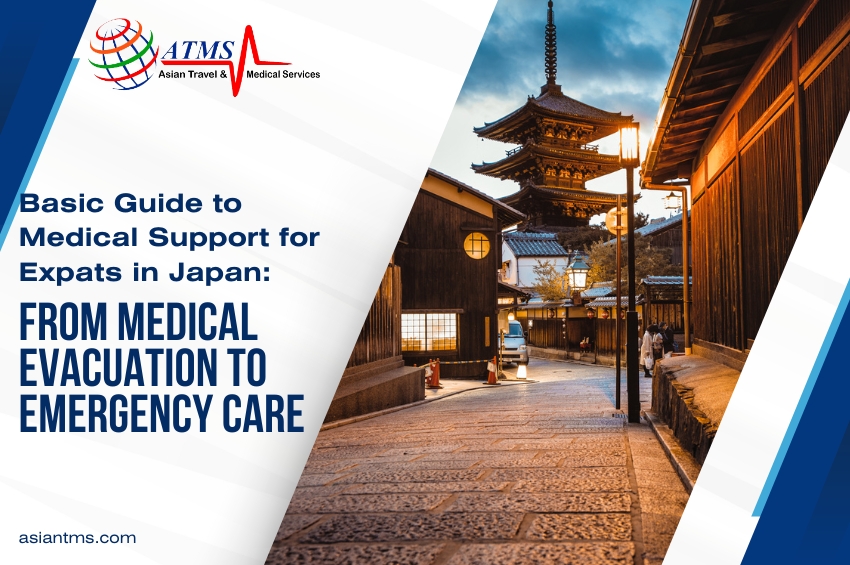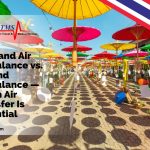
Introduction
Living as a foreigner in Japan offers a singular blend of rich culture, new infrastructure, and wonderful electronics. However, when compared with medical support for expats in Japan, many of them face surprising challenges. From vocabulary barriers to navigating crisis protocols, the knowledge of accessing healing services can feel overwhelming.
We at Asian Travel and Medical Services (ATMS) have worked with expats in Japan for years and understand the universal struggles: finding English-speaking doctors, knowing what to do in crises, and having a clear removal plan if advanced care is needed outside the country.
This guide is devised to help expats and international tourists understand by what method Japan’s healthcare system works, by what method to prepare for crises, and how ATMS can provide critical support, from everyday be fond of full-scale healing evacuation.
Medical Evacuation in Japan: Why It Matters
One of ultimate important yet frequently overlooked facets of expat healthcare is evacuation. While Japan has excellent clinics and advanced facilities, not every location offers specialized care in English or care that joins with a foreigner’s medical record, or comfort level.
Medical evacuation may be necessary when:
- A patient demands treatment, i.e., not available locally.
- An adventurer or expat feels more affluent receiving care in their home country.
- Specialized healing transport is needed after weighty accidents or critical illness.
- International repatriation is an excellent option for long-term improvement.
At ATMS, we provide inclusive medical removal coordination, ensuring that sufferers are safely transported—either that’s via air rescue, commercial flights with healing escorts, or ground transfers to major nursing homes in Tokyo, Osaka, or abroad.
We handle:
- Bed-to-bed transfers accompanying medical escorts.
- Air ambulance plans for critical cases.
- Documentation and clinic coordination across borders.
- 24/7 support so families always have someone to call.
For expats, having an evacuation plan causes peace of mind. It guarantees that care is not only immediate but also joined with individual needs, cultural comfort, and enduring recovery.
Navigating Clinics & Hospitals as an Expat
Japan performs a two-fold system of hospital help for tourists in Japan, public and private healthcare services, and expats need to know how to move between them.
• Public clinics and hospitals:
Affordable, high-quality, but commonly crowded. English support is lacking, and appointments can be harder to secure.
• Private nursing homes:
More accessible for foreigners, often accompanied English-speaking crew, but typically more expensive.
When visiting a hospital or hospital, sufferers usually:
- Present ID and any relevant healing cards.
- Pay a consultation payment (copay varies, determined by treatment and facility).
- Receive situation and prescriptions from external pharmacies.
Finding English-Speaking Support
Japan lives well and progresses in expanding English-friendly healthcare, but it’s still not complete. Platforms like ROAM provide directories of English-speaking doctors and hospitals. Expats further share recommendations on forums and communities like Reddit, where they discuss their definite and negative experiences.
For dangers, Japan also offers translation hotlines to support overseas residents. According to Pacific Prime, Tokyo and Osaka have healing interpretation duties available by phone at all the while emergencies.
At ATMS, we restore this support by offering on-demand multilingual help—so expats always have someone to define medical analyses, handle paperwork, and bridge idea gaps.
Emergency Medical Support
Emergencies in Japan follow accurate but effective obligations. Every expat bear knows the critical numbers:
- 119 – Call for ambulance or fire services.
- #7119 or #7199 – Non-crisis medical guidance hotline (varies by prefecture).
When calling, prose may enhance a barrier. An ambulance staff member may not speak English; that is where professional duties like ATMS can assist in real-time translation and coordination.
After-hours care is more available through emergency clinics and wards that rotate duty shifts. While Japan’s crisis care is efficient, ideas and navigation can feel overpowering. That’s why we advise expats to hold ATM contact details available for fast intervention.
Real Expat Experiences
To better appreciate the realities, many expats share their stories online. These insights highlight the importance of having trusted medical social workers who can act as a bridge between expats and Japan’s medical system. You can hire us to get the ideal Japan medical tourism guide.
How ATMS Support Expats in Japan
At Asian Travel and Medical Services (ATMS), we specialize in simplifying healthcare for expats and travelers. Our aids are designed to away stress, confusion, and delays so sufferers receive care as quickly and luxuriously as possible.
Here’s by virtue of what we support expats in Japan:
• Multilingual Coordination
We provide understanding in multiple languages, guaranteeing that medical consultations and administration are clear and accurate.
• Hospital Access
Our agreements with the best hospitals in Tokyo, Osaka, and beyond help expats approach quality care without useless delays.
• Medical Evacuation & Repatriation
Whether through air transport or monetary healing escort, we organize safe transfers to home nations or specific centers overseas.
• Emergency Response
24/7 help during accidents or unexpected sickness, including rescue coordination and ideas accompanying clinics.
• Local Guidance
Support with locating English-speaking providers, booking jobs, and navigating Japan’s healthcare structure.
With ATMS, expats don’t just receive care—they receive inclusive support that ensures mental freedom in every healing situation.
Steps To Consider
Japan offers advanced healthcare, but expats must be prepared to navigate allure complexities. From common clinics to life-conditional evacuations, having the right support system makes all the difference.
Here’s a simple checklist for expats:
- Learn how Japan’s clinics and hospitals operate.
- Keep crisis numbers (119, #7199) saved in your phone.
- Use services like ATMS to find English-speaking doctors.
- Prepare an evacuation plan accompanying ATMS for serious medical cases.
- Bear identification and medical documents always.
At ATMS, we are committed to guaranteeing that medical support is forever within reach for expats in Japan.
Conclusion
Asian Travel and Medical Services (ATMS) stands ready to assist each step of the way—from hospital arrangement to removal plan. Our responsibility is simple: to create healthcare for expats in Japan faster, safer, and smoothly.
Contact ATMS today to learn more about our healing support and medical evacuation Japan.



